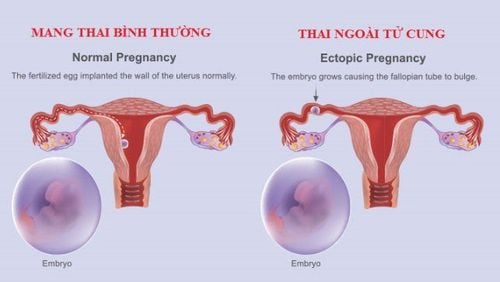This is an automatically translated article.
Nausea but not vomiting during pregnancy is a feature of morning sickness for many women. This symptom can occur at any time of the day and is difficult to control, significantly affecting the life and health of pregnant women.
1. Morning sickness during pregnancy
Morning sickness is a common condition in women in the first 3 months of pregnancy, appearing with many different symptoms, ranging from moderate to severe, and occurring at any time of the day. Morning sickness is divided into 2 types:
Common morning sickness: Occurs in about 80% of pregnant women. During pregnancy, pregnant women feel tired due to nausea and only in moderation, they still keep food in the stomach. Therefore, pregnant women do not lose weight and symptoms also gradually decrease. Severe morning sickness: accounted for about 1-1.5% of pregnant women. During pregnancy, pregnant women often experience nausea, which occurs with severity, accompanied by anorexia, fatigue, and inability to eat anything. Pregnant women will lose from 2-10 kg of weight, the body is easily weakened. The cause of this condition is due to hormonal changes in the gonads in the mother. During pregnancy, a woman's body produces a large amount of the hormone progesterone, which relaxes the muscles of the digestive system, causing food inside the stomach to push up into the esophagus and lead to a feeling of nausea. In addition, the hormone progesterone also slows down digestion, causing symptoms of indigestion. After about 48-72 hours, hormone levels can double and continue to increase throughout pregnancy.

2. Characteristics of morning sickness
Nausea but not vomiting is a typical symptom of morning sickness during pregnancy. Appears at any time of day and especially when there is stimulation of the taste of foods such as meat, fish,... Nausea lasts many times but usually does not cause vomiting, stomach still retain food and liquid. According to statistics, during pregnancy, about 70% of pregnant women have symptoms of nausea from the 4th to the 16th week of pregnancy. About 10% of these persist until the 20th week of pregnancy, even until delivery. Morning sickness often occurs in people with a sensitive body.
Besides, morning sickness during pregnancy also appears other symptoms including:
Fatigue: Nausea and vomiting a lot will make the body tired, affecting work, life and health health of pregnant women; Sensitive to smells: When pregnant women's sense of smell and taste become more sensitive, they can easily recognize harmful substances around; Changes in taste: Some people may get bored with favorite foods and crave foods that they didn't like before. A lack of nutrients will occur if a pregnant woman only eats the foods she craves, leading to underdevelopment of the fetus. Loss of appetite: Prolonged nausea is the cause of loss of appetite, reduced or completely lost appetite. Anorexia in pregnant women if not timely intervention can lead to serious consequences.

3. Measures to prevent morning sickness
Prolonged morning sickness has a significant impact on the health and life of pregnant women. Nausea during pregnancy is one of the causes of loss of appetite, fatigue and body weakness, leading to underdevelopment of the fetus. Therefore, the prevention of morning sickness is an important thing that pregnant women should apply such as:
Avoid contact with foods with irritating flavors; Drink enough water to avoid dehydration, drink it in small sips to prevent nausea; Eat small meals: Eat small meals to avoid bloating and easy digestion; Proper nutrition: A reasonable diet during pregnancy will help pregnant women feel healthy and provide enough nutrients for the fetus; Adequate sleep, reasonable rest: Helps pregnant women reduce fatigue, avoid stress and anxiety. In summary, nausea but not vomiting is a typical feature of morning sickness in pregnant women. This symptom has a significant impact on the health and life of pregnant women. For severe cases of morning sickness, it can lead to body weakness and underdevelopment of the fetus. Therefore, during pregnancy, it is necessary to have a suitable diet and lifestyle. When the condition becomes serious, go to a medical facility for examination and timely intervention.
Trắc nghiệm: Bạn có hiểu đúng về dấu hiệu mang thai sớm?
Các dấu hiệu mang thai sớm không phải chỉ mỗi trễ kinh mà còn có rất nhiều dấu hiệu khác như xuất huyết âm đạo, ngực căng tức,… Điểm xem bạn biết được bao nhiêu dấu hiệu mang thai sớm thông qua bài trắc nghiệm này nhé!
Understand early signs of pregnancy, pregnancy poisoning, bleeding during pregnancy. Timely, correct and sufficient first prenatal check-up, avoiding too early/too late. Fetal malformation screening at 12 weeks detects dangerous fetal malformations that can be intervened early. Distinguish between normal vaginal bleeding and pathological vaginal bleeding for timely intervention to maintain pregnancy. Screening for thyroid disease in the first 3 months of pregnancy avoids dangerous risks before and during delivery. Vinmec currently has many maternity packages (12-27-36 weeks), in which the 12-week maternity package helps monitor the health of mother and baby right from the beginning of pregnancy, early detection and timely intervention of health issues. In addition to the usual services, the maternity monitoring program from 12 weeks has special services that other maternity packages do not have such as: Double Test or Triple Test to screen for fetal malformations; Quantitative angiogenesis factor test to diagnose preeclampsia; thyroid screening test; Rubella test; Testing for parasites transmitted from mother to child seriously affects the baby's brain and physical development after birth.
For more information about the 12-week maternity package and registration, you can contact the clinics and hospitals of Vinmec health system nationwide.
Please dial HOTLINE for more information or register for an appointment HERE. Download MyVinmec app to make appointments faster and to manage your bookings easily.













